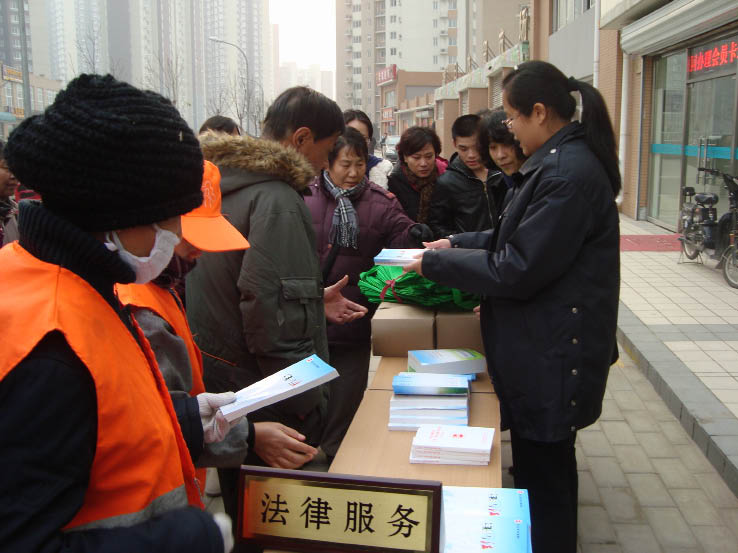Grassroots Judges: Community Disputes Nipped in the Bud
By CHEN JIE
I am a judicial assistant at the Shuangqiao Tribunal affiliated to Chaoyang District Court in Beijing. After obtaining my MA from the China University of Political Science and Law in 2008, I first worked at Jiuxianqiao Tribunal and transferred to my present position in July of 2011. At that time Shuangqiao Tribunal was promoting a grassroots judiciary system and building two workstations to handle the judicial affairs of five administrative villages. They were selecting judges for the two workstations based in Guanzhuang and Changying, and I was assigned to Changying.
As a grassroots judicial officer, my job is to promote villagers' legal awareness, mediate domestic and neighborhood disputes and travel to both villages and residential blocks to act as judge at local court sessions. Most families in China’s villages are inter-related one way or another, and their discords are complicated and difficult to resolve. A judicial decision may point out the rights and wrongs of a case but can do nothing to ameliorate the estrangement or sometimes hostility that it causes among the parties involved. Mediation, however, has been shown to resolve many of the disputes that arise among villagers. Our work in this respect has become much easier since the Supreme People’s Court issued the People’s Mediation Law that, with the confirmation of local courts, makes the mediation procedure legally binding.
|
 |
| Chen Jie and her colleagues give judicial consultations to local residents. |
In practice, I find that exemplary court hearings work well in scaling down potential lawsuits between local residents to self-initiated, peaceful reconciliations. There are under my jurisdiction several newly built residential communities of apartments designed and built specifically for people on low incomes as part of the government’s low-income housing program. The size and style of such apartments and their selling and rental prices are consequently government-controlled. The Poly Jiayuan is one of them. To economize on both space and funds, its developer designed and built a stand between every two apartments on which to place the outdoor section of an air conditioning unit that would be shared by the two neighbors. But complaints about this design ensued after residents started to move in. Unaware of the developer’s intention, early comers assumed that the stand was solely for their use, which caused resentment among residents that arrived later. My fellow workers and I arranged a demonstrative court hearing of one such case that representatives of both the property owners and of the real estate company attended. After mediation, the two families involved reached an agreement whereby the early comer had the unit dismantled to make room for the latecomer, and both parties shared the costs entailed.
Popularizing law by inviting residents to attend such hearings, where judicial workers make a detailed analysis, explain the legal ramifications and answer questions, is a main function of our workstation. As such disputes are common in the neighborhood, the hearing has acted as a yardstick that enables residents to solve their discords independently. Since the Poly Jiayuan hearing there have been no instances of similar lawsuits.
Being employed at the workstation means contact with local residents rather than sitting in a court office. This gives us a better idea of what the people need, how they think and the most efficacious way of carrying out mediation, to the extent of being able to resolve disputes on the spot. My jurisdiction covers both urban and rural areas. Born and raised in the city, I was at first unfamiliar with rural life and the related disputes that arise. I have since learned that making fair and just judgments of cases requires a high degree of familiarity with the people involved. After more than a year of contact with local residents I now know them well enough to explain legal articles in plain language, rather than parroting rules and regulations in legal terms. Residents are now far more likely to listen to, understand and accept our mediation and advice.
Our workstation is very convenient for local householders. The only course previously open to them when they needed legal advice was to find a lawyer – a costly business. The formal, rigid court atmosphere also canceled out any possible inclination they might have had to compromise or be flexible. Rather than having to deal with a judge in court at an appointed time, they can now come to our office whenever it suits them to talk and ask for advice.
With the gradual establishment in recent years of a well-rounded legal system, people have developed a deeper legal consciousness and with it the ability to protect their rights. Lawsuits, however, demand time, money and energy. Grassroots legal workstations like ours help stifle disputes in a more informal and timely manner. We often find that irate residents that come to us with complaints calm down and sometimes even admit that they are in the wrong after talking to us. This precludes the need to file lawsuits and enter legal proceedings, so saving trouble for all concerned. As legal terms might be inappropriate in domestic disputes, plain clarifying language is sufficient to make those involved see sense.
Mediation before resorting to legal proceedings is both effective and economical as it meets the people’s needs and settles disputes. Before working at the local workstation, I handled more than 300 filed cases a year. Those I have since dealt with are far fewer.
The grassroots judiciary system has now been expanded to cover the entire Chaoyang District and shows impressive results. Still at an exploratory stage of limited mediations and legal consultations, we are considering new functions that could be of benefit to the people.

